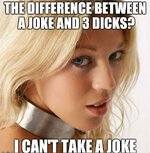Elixir
Made in America
Sick joke I didn't make up!!!:
A father was being taken in to see his newborn. After being taken past several wards and and many healthy babies, eventually he's taken to a cot where it's just an eye on a pillow.
The Father was stricken with grief and sadness, then says - well if it's my son, and he's looking up at me then I'll love him all the same.
The doctor then says - oh he won't be able to see you, he's blind.
A father was being taken in to see his newborn. After being taken past several wards and and many healthy babies, eventually he's taken to a cot where it's just an eye on a pillow.
The Father was stricken with grief and sadness, then says - well if it's my son, and he's looking up at me then I'll love him all the same.
The doctor then says - oh he won't be able to see you, he's blind.

